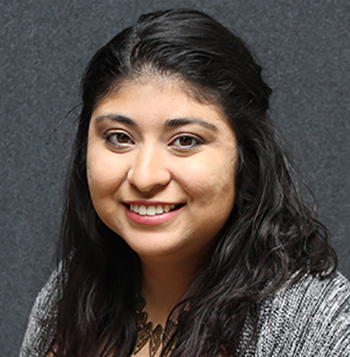 Before there was a #MeToo movement and a renewed focus on workplace harassment and discrimination, there was Nicolette Brown, combining her love of research with a passion for creating inclusive work environments. The 2018 MCB Outstanding Graduate Student for Service, Brown has worked to make herself a valuable resource for the College of Science on diversity and inclusion.
Before there was a #MeToo movement and a renewed focus on workplace harassment and discrimination, there was Nicolette Brown, combining her love of research with a passion for creating inclusive work environments. The 2018 MCB Outstanding Graduate Student for Service, Brown has worked to make herself a valuable resource for the College of Science on diversity and inclusion.
“I go to a lot of diversity and inclusion workshops, on and off campus, and I always learn something new—there is always another perspective I hadn’t considered,” Brown enthuses.
She brings this knowledge to work for the university, “I am the graduate student and MCB member on the Workplace Climate Committee for the College of Science.”
The committee was set up in 2017 to address concerns raised in a 2016 CoS Workplace Climate Survey and has been working to promote inclusiveness by developing guidelines and tools, sharing best practices, and promoting awareness of individual’s rights and resources in workplace disputes.
“We are working on workshops for faculty and staff,” Brown reports, noting some faculty have had the opportunity to participate already, adding “we finalized plans for what is tentatively being called CoS Experiences (or Awareness) week to be held in September.
Brown is also Vice President of the Associate Graduate Council for the College of Science (AGCCS), advocating for providing graduate students with training that will help them contribute to fostering inclusive workplaces and classrooms.
“AGCCS's first implicit bias workshop was great,” Brown exclaims, “and we hope to continue similar programming.”
Whether obtaining a certificate as a Leader in Classroom Diversity and Inclusion, or developing her understanding of microaggressions, creating accessible teaching plans, imposter syndrome, or communicating science to the public, Brown has been expanding her toolkit.
“Diversity and inclusion symposia lead to awesome discussions,” Brown enthuses, citing the UA Inclusive Excellence Symposium hosted by ODIEX in particular.
In communicating science to the public, “learning how to listen is important,” Brown says, noting conversations about science can sometimes have similarities with conversations about race. “You have to find common ground. “
Working in Dr. Timothy Bolger’s lab in MCB, Brown has found a PI who listens and supports her passion.
“Nicolette has always had an interest in questions of science public policy and communication,” according to Bolger, “and it has been a pleasure to watch as she has become increasingly involved in the last couple of years.”
Brown credits Bolger with supporting her pursuits whether in the lab or in science policy.
When asked why she picked Bolger’s lab when she arrived in Tucson five years ago, Brown quickly responds, “It was Tim—he’s a great mentor, and he’s super supportive.”
Brown’s work outside of the lab has been helping her prepare for a career in science communication and policy, which she hopes to jump-start with a science policy fellowship with the American Association for the Advancement of Science in Washington, DC. Inside the lab, she has focused on studying mutations found in pediatric cancer patients with medulloblastoma.
“There’s a 70-80% survival rate for medulloblastoma,” Brown notes of the brain cancer, “but with serious side effects from the chemotherapy and radiation.”
She hopes her work to better understand the mutations involved will help lead to more targeted therapies. Currently, patients can suffer lifelong side effects, including learning and development problems.
In presenting her work to the public, she uses a highly effective analogy, “With this research, it's like when you go to the mechanic to fix your car, they have a car manual to tell you what's wrong and where the oil needs to go. The mechanic doesn't pour oil all over the engine and hope some drips into the right place. That's like chemotherapy and radiation—it can do more harm than good. We want to create a manual for the cell so we can target the ‘oil tank.’”
Brown is taking a look at what is happening inside in the engine by expressing mutations from medulloblastoma patients in a yeast model system and observing the effects of the mutations based on translation.
Aiming to complete her studies by the end of the year, Brown is looking forward to launching her career in science policy. With her BMCB graduate family, she has found the support to get there.
“This was the right fit for what I needed as a grad student,” Brown confirms. “I am close with the BMCB grad students. We get together for happy hours, movies, and I feel supported.”
With this latest recognition for her policy and advocacy work, it is clear that Brown is ahead of the curve in understanding the importance of diversity and inclusion in the workplace and is well-positioned as a future leader in this area.





